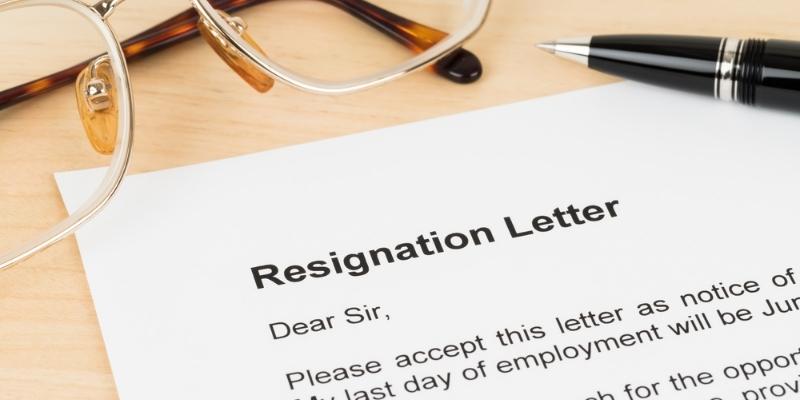There are many reasons for you to resign from your current job, maybe you have a better opportunity lined up or perhaps you are taking time out to go travelling. Whatever your next step, resigning from your job doesn’t need to be difficult or stressful.
In this post, we will discuss the right way to resign, how to inform your employer and what to do if you are having second thoughts.
Follow the resignation rules of your company
Every company will have a resignation policy, so if you are debating handing in your notice you may want to check the terms and conditions of your contract first to understand your notice period. Depending on your level you could be expected to give two weeks’ notice, two months’ notice or it could be longer.
In certain industries, employees could be placed on gardening leave if moving to a rival company. This is where you are employed by your current company and keep getting paid but you can’t work for them or join your new employer.
Once you have understood the notice period for your current position, you can begin to draft your letter of resignation.

Your resignation letter
It is standard practice in every industry to write a formal letter detailing your resignation.
How you write your formal resignation letter depends on the circumstances of your departure.
Most companies will require a simple letter of resignation. It should be addressed to your direct supervisor and your HR department, and include details of your notice period when this is effective and your signature.
If you want to ensure you leave with a good reputation or are sad to be leaving behind your co-workers, you may want to add an extra paragraph to thank your current employer for the opportunities you have been given and express your sadness to be leaving.
If you are leaving on bad terms, for example, due to working conditions or lack of opportunities in your current role, it can be detrimental to go into too much detail as this could put you in a bad light should you cross paths with your former employer in the future.
Resign face-to-face if possible
While it can be tempting to email your resignation letter to your hiring manager, you want to ensure that you resign in a professional manner and that includes doing it face-to-face.
What to do if you can’t resign in person
Sometimes, you might be unable to resign in person because you work remotely or perhaps you and your boss work in different locations. Whatever the reason, there are a few things you can do to ensure that you leave on a positive note and resign professionally.
Resign over the phone
If you are unable to resign face-to-face, then you should use a phone call as your second point of call. With phone calls, it’s important to be fully prepared with exactly what you want to say and you should ensure you keep it professional and polite.
Give your reason for resigning, however, you don’t need to go into too much detail or continually apologise. For example, you could say that you have a new job lined up and wish to seek this new opportunity as you believe it is best for your career.
Continue to thank your employer for their support and follow up with your resignation letter. You may want to keep a copy for your personal files.
Resign via email
You should only resign via email if it’s your only option. It is still recommended to have a discussion with your manager first before hitting send.
As above, you want to ensure that you give a brief reason for resigning and thank your employer for their support. Ensure that you include your last day of work and mention your notice period.
What to do after you’ve handed in your resignation
Once you have handed in your resignation letter for your current job, it is likely you will have an exit interview with your HR representative and need to create a handover pack for your boss to ensure a smooth transition for the next person that takes on your role.

Exit Interview
Most jobs will ask you to attend an exit interview before the termination of your employment contract. This is for the HR department to understand your motivations for leaving and if anything could have been done differently to make you stay.
It’s important to stay positive throughout this interview, even if you are leaving because of poor working conditions or conflicts with co-workers as it will put you in a positive light.
Tie up loose ends
Your final few weeks of working will likely be you tying up loose ends and ensuring that you have everything ready to hand over to your manager while they find someone new to take on your role.
Say Goodbye to people you worked closely with
Before you leave, take the time to write a short note to your closest colleagues who you have worked with over the years. If you want to keep in touch with them, add your details to the end of the mail.
Having second thoughts?
If you are having second thoughts about resigning from your current job, it’s not too late. Think about it before jumping into resignation and if you are unsure, talk to your manager about it before making the final decision.
Being certain that you want to move companies and roles is vital. While your new role might be offering you a higher salary, you want to ask yourself if you are doing the right thing.
Think about what you want to achieve from your career, and ask yourself:
- What do I enjoy about my current job role?
- What does my new job role offer me that my current one doesn’t?
- Have I explored every option within my current role?
- Would I still leave if I were offered career advancement?
Try to stay positive throughout and don’t sell yourself short. If you are driven and want to achieve your goals, don’t worry about leaving your current job role if your new job can offer you exactly what you want.
Good luck!

